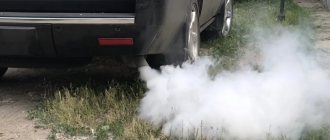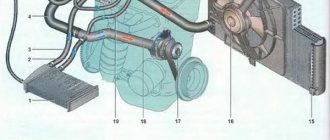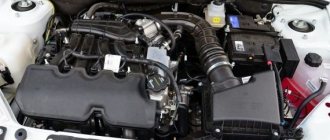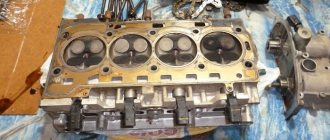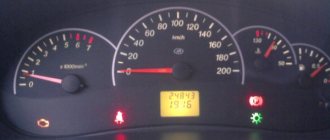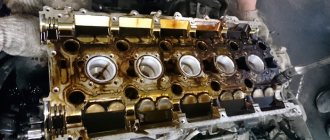For certain reasons, any car engine can begin to run rough and noisy, run rough, and function unstable after a cold start. An equally common problem is the appearance of suspicious noises and knocking noises after the engine has warmed up and reached operating temperature. If a gasoline engine is noisy, then many motorists compare the operation of such an engine with the characteristic sound of a diesel unit.
The fact is that a diesel engine always operates rougher than a gasoline internal combustion engine, creating unique and clearly distinguishable knocking noises. This is explained by a different principle of ignition of the mixture in the cylinders, which occurs from compression, and not from the spark plug.
We also recommend reading the article about why a diesel engine can stall during a cold start and after reaching operating temperature. From this article you will learn about the main malfunctions that cause noisy and unstable operation of the power unit.
Malfunctions of a particular engine system can, with a high degree of probability, be localized by the behavior of the motor in different operating modes, determined by ear, etc. You can also visually assess the color of the exhaust gases, which will indirectly indicate the problem. If a gasoline engine “knocks” like a diesel engine, runs unevenly or troits, then the reasons may be as follows:
- low quality or inappropriate fuel;
- wear or malfunction of the CPG or timing belt;
- problems in the fuel supply system;
- ignition system problems;
- malfunctions of the cooling system, lubrication, etc.;
Ignition system malfunctions
As mentioned above, low-quality gasoline has a detrimental effect on the operation of spark plugs. However, even when using good fuel, do not forget about replacing them regularly. Previously, spark plugs were most often changed when the engine began to clearly lose its dynamic qualities or have difficulty starting.
Today, most manufacturers recommend in service books to replace spark plugs annually or after 15 - 20 thousand kilometers. In this case, they are not the cause of deterioration in engine performance. However, you can buy defective products, and then signs of their poor performance will appear, including misfires.
Therefore, you should not buy cheap candles from an unknown manufacturer - the savings may backfire. Missing sparks can also be caused by the ignition distributor and the high-voltage part of this system: wires and coils.
Problems with the cylinder-piston group
If the engine suddenly and distinctly knocks, knocks, pops, friction and crunching are heard, then operating the car is strictly prohibited. It is necessary to immediately determine the cause of the knocking. In some cases, it will be preferable to abandon the decision to go to a car service under your own power and deliver the vehicle in a tow or tow truck. A low knocking sound at the bottom of the engine crankcase, which intensifies when the engine is under load and when the crankshaft speed increases, may indicate that the main bearings are knocking. When this sound occurs, the engine must be turned off immediately. Main bearings may knock due to critically low oil pressure in the lubrication system. Additionally, the emergency lamp on the instrument panel lights up and does not go out. You can't drive under your own power with that kind of noise.
Knock Characteristics
Extraneous sounds produced in the power plant are divided according to four main criteria:
- Force;
- Sound;
- Cyclicality;
- Cause and effect of noise.
The strength of the knock can be subtle, medium or loud. If the knock is weak, you can continue to drive the car, but it’s still worth going to a car service center for diagnostics. If the knocking is of medium intensity, then the machine should be parked as soon as possible for diagnostic work and scheduled maintenance.
If loud, distinct knocking noises appear inside the engine, you should immediately stop using the car, since all signs indicate significant problems in the operation of the engine. It is best to deliver such a car to a car service using a tow truck or tow truck.
Like strength, the sound of a knock can be different: ringing (metallic) and dull. A loud knock indicates the contact of two hard elements without an oil layer, and a dull knock indicates the impact of parts, one of which is soft, and at the same time there is an oil layer.
The cyclical characteristics of the impact make it possible to determine the degree of need for urgent repairs. So, a spontaneous knock or knock that occurs without a system may be the beginning of problems with the motor, or it may be the cause of attachments (for example, a loose generator). If the knocking is regular, then you should immediately seek the services of specialists.
Read also: How to update lexand sa5 navigator
How to fix the problem
Each specific case has its own algorithm of actions. If it is determined that the rumble is a consequence of using low-quality oil, you just need to switch to another fuel oil. It should be remembered that it is inadmissible to use oil without changing it for a long time. The same applies to broken hydraulic compensators, valves and camshafts.
Extraneous sounds due to timing belt faults
Timing problems can also cause a gasoline engine to operate like a diesel engine. Most often, the gas distribution mechanism begins to make obvious noise for two reasons:
- valves are knocking;
- hydraulic compensators are knocking;
The knocking of valves is clearly distinguishable against the general background and has a “metallic” ringing sound. This sound is localized in the cylinder head area, above the valve area. A knocking noise is clearly audible at low and medium crankshaft speeds. It is not recommended to drive for a long time with knocking valves, but getting to the service station on your own is quite possible.
Article on the topic: Car roof rack - install it yourself
As for the hydraulic compensators, their knocking is clearly distinguishable “when cold” and the sound resembles the operation of a well-warmed-up diesel engine. Hydraulic compensators may knock a little on a fully functional gasoline engine in the first minutes after starting, thus layering on the characteristic “clicking” sound of the operating injectors of an injection engine. With the onset of even slight warming up, the sound similar to the operation of a diesel engine should become less intense, and completely disappear at operating temperatures.
If this does not happen, then the reason may be unsuitable engine oil, problems with oil pressure in the lubrication system of a gasoline engine, etc. The failure of only one hydraulic compensator will be manifested by a distinct metallic knock “when hot” in the area of the valve cover. The sound can be either constant or occurring periodically. Most often, the hydraulic compensator knocks at the same level in terms of sound intensity; the rhythm will change in the same way as the crankshaft rotation speed changes.
Wear of ShPG parts
The connecting rod and piston group is subject to significant loads during engine operation. As long as the gaps between the rubbing surfaces do not exceed the permissible limits, a gasoline engine is much quieter than its diesel counterpart.
However, as the gaps increase as a result of natural wear and tear, metallic knocks of various types begin to superimpose on the pleasant rustling background. The gasoline engine operates almost like a diesel engine. Sources of knocking in the connecting rod and piston group:
- Main bearings, wear of which is accompanied by low-frequency knocks emanating from the crankshaft beds. The sound changes according to load and crankshaft speed. A possible cause of wear is engine oil starvation. The appearance of such sounds requires urgent contact with a car service in order to minimize possible consequences.
- Connecting rod plain bearings. These parts produce distinct, loud metallic knocks, the source of which is the middle of the cylinder block. Knocks are heard especially clearly when the load increases. To determine their source, the spark plugs are turned off one by one. Driving with such symptoms is fraught with engine destruction.
- The piston pins produce high-pitched ringing sounds, somewhat reminiscent of detonation knocks. This sound is less dangerous than knocking of crankshaft bearings, although in any case it must be eliminated. Before visiting a repair service, you can drive for a while, avoiding increased load and high engine speeds. You should also monitor the operation of the lubrication system, and most importantly, monitor the oil level.
- Worn pistons. They make dull knocks, somewhat reminiscent of the rumble of a diesel engine, which can be heard after a cold start. As the engine heats up, their audibility decreases. You can drive in quiet mode, but you shouldn’t put off major engine repairs too much.
Attention: when a knocking noise in the engine appears suddenly, you must stop driving and call a tow truck to get to the nearest auto repair service.
Exhaust system leaking
The exhaust system can reproduce the richest sound gamut. Thanks to constructive measures, developers achieve a noble exhaust sound character.
However, the consequences of winter operation lead to the fact that one day you will hear a rattling sound from the muffler of your car, reminiscent of the exhaust of a direct-flow muffler. From now on, all street racing fans will perceive this sound as an invitation to compete at the traffic lights.
The reason that the engine rumbles like a diesel engine is a leak in one or another element of the exhaust system. All of its components can burn out: the main and additional mufflers, the resonator, the catalytic converter of the exhaust gases, the corrugation, the exhaust pipe (pants) and the exhaust manifold gasket.
Before reaching this state, a small fistula appears through which gases escape (the leaky part “cuts,” as drivers say). Finding the location of the damage is often difficult, so the hole gradually increases until listening to the lion's roar of the exhaust becomes unbearable.
Sometimes there is no external damage, but the tractor sound is present. This happens when you knock out burnt ceramic honeycombs from the catalyst and drive with such an “improvement”.
Refueling with low-quality fuel
Many systems and devices of the power unit can contribute to the fact that a gasoline engine operates like a diesel engine. However, there is one external reason that contributes to the appearance of unusual sounds. This is low-quality fuel.
The main property of gasoline, which characterizes its resistance to detonation (explosive pre-ignition), is the octane number. If the engine is designed for AI-95 gasoline, and at the gas station you were filled with low-octane fuel, troubles are inevitable.
- Under certain loads, fuel detonation occurs, accompanied by detonation knocks reminiscent of the ringing of piston pins and, remotely, the sound of a running diesel engine.
- To increase the octane number, octane-increasing additives are added to low-grade gasoline, which are deposited in the nozzles of the working injectors on an injection engine. The supply of fuel to different cylinders becomes uneven, which leads to harsh engine operation. In advanced cases, the injectors become completely clogged, as a result of which the engine begins to “trouble.”
- The additives contained in “bodied” gasoline cover the electrodes of the spark plugs with a layer of red soot, and due to misfires, the engine again “troubles.”
Tip: try to refuel at chain gas stations located in large populated areas or along busy highways. If you run out of fuel, fill up the minimum amount of gasoline at the first gas station you come across in order to get to the nearest verified gas station.
About the concept of “works like a diesel”
What is meant when it comes to running a gasoline engine like a diesel engine? As you know, a diesel engine is characterized by rougher operation and is characterized by knocking. This is explained by the fact that the mixture is ignited not by the spark plug, but by compression. A malfunction of a particular engine system can be identified by characteristic noises, knocking noises and the overall behavior of the engine. The problem can also be judged by the color of the exhaust gases. If you hear that a gasoline engine is unstable, knocks like a diesel engine, or troits, then the reasons may be the following:
- the first is fuel, or rather its low quality or inadequacy;
- malfunctions in the fuel supply system;
- malfunctions in the lubrication or cooling system;
- The timing belt or CPG is worn out or faulty.
As we can see, there are many options why a gasoline engine works like a diesel engine.
Let's take things one by one and start with fuel quality. In addition, do not forget to check the oil level in the engine. A gasoline engine can operate like a diesel engine due to the low octane number of the fuel, i.e. the fuel is not suitable for the engine in your car. If the reason is low-octane fuel, then you can hear it when starting the engine cold, and during further driving you will also hear it. This knocking sound is called detonation in the engine cylinders. It is impossible to say with confidence that the sound is similar to the operation of a diesel engine, because it only vaguely resembles it. Detonation can be clearly heard when the engine is running under load while accelerating the vehicle. The nature of the knocks is ringing and resembles the impact of metal on metal at high frequency.
Fuel is not the only thing that can cause detonation. The reason may be a faulty knock sensor, as well as on a car with a manual transmission when driving in high gears at low speed. Another option is that quite dense carbon deposits have formed on the valves and in the combustion chambers. On engines where the OZ is set manually, detonation may also occur due to incorrect settings. As a result, the mixture burns out already on the exhaust stroke, while the engine runs roughly and with characteristic knocking noises. If fuel with a low octane number gets into the tank of your car, you can correct the situation by refueling with the appropriate gasoline or adding a special additive.
Timing faults
Breakdowns or wear of timing parts (gas distribution mechanism) can also be involved in the appearance of extraneous sounds under the hood of a gasoline engine. The most common faults:
- Valves are knocking. This disadvantage is inherent in older gasoline engines, which required periodic valve adjustment, even during the first annual maintenance. Knocking can be caused by unqualified repairs (poor fit of the valve plates to the seats), as well as deformation due to overheating of parts.
- Hydraulic valve compensators are knocking. Modern valve mechanisms equipped with automatic adjustment are more durable, however, even in this case, the hydraulic compensators wear out sooner or later, after which they should be replaced.
- The timing chain drive is loose or worn. In this case, the dangling chain touches the guard cover, which causes a rattling knock.
- The timing belt jumped several teeth, causing the valve timing to be disrupted. The engine runs harshly, untimely combustion of fuel causes a characteristic diesel sound.
- The bearing beds of the camshaft are worn out, which causes noticeable knocking noises, especially when the engine is not warmed up, when the gaps in the bearings have not yet been cleared.
Let's sum it up
Listed above are the most common reasons why a gasoline engine behaves like a diesel engine. In the list of other possible reasons for the noisy operation of a gasoline internal combustion engine, it is worth noting a malfunction of the cooling system, especially when the engine cannot reach operating temperature. In this case, thermal clearances do not reach optimal levels, which leads to increased noise levels. The problem may also be a malfunction of the engine computer or electrical circuits, timing drive, attachments, etc.
What to do if the car accelerates worse, does not pick up speed, or has failures during acceleration. Why the engine does not pull, how to find the reason for the decrease in power.
The car engine starts and stalls immediately after starting: the main causes of this malfunction. Diagnosis of possible causes, tips and recommendations.
Signs of a non-working cylinder (tribbing and vibration) of a diesel engine. Troubleshooting: compression, diesel injectors, glow plugs, injection pump and others.
The appearance of knocking noises in different diesel operating modes. Fault diagnosis. The nature of the knocks of the crank mechanism, timing gear, and fuel equipment.
Common diesel engine malfunctions and diagnostics of units of this type. Checking the fuel system of a diesel engine, useful tips.
Causes and results of diesel engine overheating. What to do if the diesel engine is overheating: diagnostics and troubleshooting. Important recommendations.
What does “diesel gasoline engine” mean?
A special feature of diesel engine is the increase in engine operating noise. It is better to leave a car with such a breakdown in the garage; it is unsafe to drive it. Typically, diesel combustion indicates damage to the power unit, which is best eliminated at the time of its early manifestation. Otherwise, you will soon have to carry out major repairs.
Diesel engines make more noise than gasoline engines because their ignition system is designed in a special way. Dieselization of a gasoline engine is the appearance of noise characteristic of diesel engines. Noise usually appears when the engine is running cold or idling. There can be many reasons for this unpleasant phenomenon, but they are all related to the timing belt assembly.
Knocks due to detonation
To identify the problem and answer the question why a gasoline engine began to knock like a diesel engine, you must immediately start by checking the quality of the fuel and the level of the engine oil. A gasoline engine can operate like a diesel engine due to the fact that it is filled with low octane fuel, which is not suitable for this type of engine. Increased noise when the engine is running on low-octane gasoline will partially appear during a cold start, and is also very noticeable during further driving.
How can these problems be solved?
Having determined what problems may result in the engine running loudly, we will try to consider their solution:
Solving problems with the thermostat or gas distribution system will require turning off the engine completely and cooling it. This situation can occur when a very small gap is installed in the valves. In this case, the engine operates jerkily. To eliminate the problem, you need to use a feeler gauge to set the required gap size. After which it is recommended to check the tension of the belt drive. The thermostat can cause problems by leaking excess fluid. This leads to insufficient cooling of the engine, and as a result, its loud operation. To get it to work properly, you need to thoroughly clean the thermostat or replace the old one with a new one.
Thermostat
- Now let's look at the next problem - late ignition. Upon release of the incoming mixture, combustion continues. In this case, it is recommended to set the octane corrector to the zero position. If the engine begins to operate intermittently, it is best to loosen the distributor housing and adjust the ignition using the control lamp. In this case, it is necessary to eliminate the play of the slider - to do this, holding it with your hand already during the ignition process, re-fasten the housing.
- Unstable engine operation may indicate a problem with the carburetor. This problem can be detected if there is a smell of gasoline, which is especially noticeable when the hood is opened. This may also be accompanied by the accumulation of fuel liquid - this indicates that the seal is broken. To get rid of these problems, remove excess fluid and clean the intake tract. For this purpose, it is enough to idle for a few minutes. A violation of the tightness indicates wear of the valve, which is best replaced with a new one or restored the old one.
- During operation, loosening or oxidation of clamps and wiring terminals may occur. To solve this problem, it is enough to carry out the usual cleaning of contacts and connection points.
- The use of fuel that has a low octane number may cause the propulsion system to operate excessively loudly. To fix this problem, you need to switch to gasoline of the brand recommended by the car manufacturer. This will solve many problems that may arise on our roads and, as always, at the most inopportune moment.
Causes of diesel engine knocking
The knock itself is a consequence of one element hitting another. The most common causes of diesel knocking are as follows:
Camshaft knocking
A distinctive feature of camshaft problems is the dull knock of a diesel engine when cold. After the engine warms up, oil flows to the bearings and the knocking goes away. In this case, we can talk about significant wear of the shaft bearings. It is caused by the presence of various impurities in the engine oil, which during operation lead to scratches on the shaft. If this problem is not eliminated, then in the future the knocking will spread to the warmed-up engine.
Crankshaft knocking
Crankshaft knocking occurs due to wear of the journals or bearings and an increase in the distance in the bearings. This leads to a decrease in the quality of engine oil and a lack of lubricating fluid on the bearings, as well as water or antifreeze getting into the oil and deformation of the crankshaft journals.
Faulty injector, jammed needle in the nozzle, as well as malfunction of the high pressure fuel pump (HPF)
The knocking of the plunger (a cylindrical piston with a length exceeding its diameter) of the injection pump is caused by the low quality of diesel fuel, and diesel knocking is possible at idle speed and when adding speed. In addition, noise from the fuel pump can appear completely unexpectedly while driving.
Distribution phase failure
As a rule, this “clinical picture” appears when the length of the piston is insufficient to reach the valves. This causes malfunctions and, as a result, a characteristic knock.
Knock of diesel injectors
The “proprietary” source of knocking from a diesel engine can be injectors. The diesel injector is one of the main elements of the diesel engine power supply system. The nozzle (injector) provides direct supply of diesel fuel into the diesel combustion chamber, as well as dosing of the supplied fuel at a high frequency (more than 2 thousand pulses per minute). The injector effectively sprays fuel in the space above the piston. As a result of this spray, the fuel takes the form of a torch. Injectors of fuel supply systems that differ from each other have design features and differ in the control method. Injectors are divided into two groups: mechanical and electromechanical.
The knocking sound of a diesel injector is usually very noticeable and sounds like a chattering or clicking noise coming from the top of the engine. The knock comes literally from under the decorative (noise-proof) engine cover, if present. You can also recognize the clicking sound of an injector by grabbing its fuel line. After touching the fuel line, a vibrating knock “coming” from the engine will be felt.
Nozzle wear
The injector nozzles have the fifth class of manufacturing accuracy. Such a precise detail completely eliminates the ingress of dirt and water. The sprayer is lubricated with diesel fuel. Damage to the working edge of the nozzle significantly impairs the quality of fuel atomization and distorts the direction of injection. Contrary to popular belief, injectors damaged by low-quality diesel fuel cannot be washed or cleaned. The malfunction can only be eliminated by replacing the nozzle. A knocking noise is one of the symptoms of a worn injector nozzle.
Nozzle knocking is an early and very sure sign indicating the need to replace the nozzles. Sometimes adjusting the injection pressure helps for a short time (during operation and wear of the nozzle, the pressure naturally decreases). The reason for what is happening is as follows: in worn nozzles, the needle sealing band is significantly larger than in a new one, and therefore, with the same spring force, the specific pressure on the sealing band is less and the sprayer does not seal, i.e. the slightest disturbance (be it air or varnish deposits) is enough for it to stop spraying fuel. The motor reacts to this with a knock. Just don’t think that the decreased specific pressure can be compensated for by tightening the spring more tightly. This will be an interference in the operating conditions of the fuel injection pump and in the engine’s operating process, and it’s easy to mess things up here. Sometimes a good wash of the needle and cavity of the nozzles to remove varnish deposits helps, but, firstly, this must be done with some preparation, and secondly, take into account that nozzles are now not that expensive and replacing them is also not a terrible operation. And also the fact that driving on pouring nozzles definitely leads to cracking or burning out of the cylinder head, and in some engines, pistons, so it makes sense to approach this problem carefully.
You can choose diesel electric injectors and many others for your car on our website
Difficulty starting the UMZ engine when cold
The issue of cold starting is problematic both for specialists and for the car owner. This situation arises due to the fact that the car arrives for diagnostics with a hot engine, and when it is hot it starts just fine. The owner cannot check a cold engine on his own due to the lack of diagnostic equipment.
However, there are a number of important reasons why the UMP engine is difficult to start when cold:
- low compression in cylinders;
- low fuel pressure in the injector rail;
- valve thermal clearances do not meet specifications;
- wear of spark plug electrodes;
- nozzles are not tight;
- faulty coolant temperature sensor;
- leakage and mixing of gas (propane, methane) with gasoline at the time of startup;
- Absolute pressure sensor malfunction;
- malfunction of the mass air flow sensor (if included);
- presence of water in the tank.
It should be noted that experts identify some of the listed defects on a hot engine, but even after they are eliminated, the question remains open until the next time the engine is started on a cold one.
Other reasons
The appearance of “diesel” sounds is influenced by malfunctions in other engine systems. Incorrect cooling operation leads to the fact that the engine temperature does not reach the optimal value for the normal flow of the working process in the cylinders. In this case, the thermal gaps exceed the design ones, which causes additional noise from the contact of interacting parts.
If the oil pressure in the lubrication system is insufficient, the conditions for the formation of an oil wedge in bearings operating in hydrodynamic lubrication mode worsen. The consequence is a rougher interaction of the working journals of the crankshaft and camshaft with their beds.
There are other reasons, sometimes quite rare. For example, after overcoming a deep muddy rut, the space between the oil pan and its metal protection becomes clogged with liquid mud. After the car has been parked overnight, this dirt dries up, and the driver, when starting the engine in the morning, is quite puzzled by the unexpected vibration of the engine unit.
This fever is accompanied by knocking noises reminiscent of the work not even of a diesel engine, but of a construction hammer. It is difficult to discover the cause. It turns out that dried dirt interferes with the damping of torsional vibrations of the engine, and the latter are transmitted to the body of the car, causing vibrations and frequent knocking.
Summarizing the above, we can conclude: there are many reasons why sometimes a gasoline engine works like a diesel engine. Among them there are both harmless and very dangerous, which, if timely measures are not taken, can lead to breakdown of the power unit. Therefore, do not ignore any extraneous noises and sounds that are unusual for the operation of a gasoline engine.
Source
Why does a gasoline engine work like a diesel engine: reasons
Car manufacturers have always struggled to make engine operation silent. This also applies to domestic automakers. The engines of rear-wheel drive VAZs worked quietly at first, but after a certain mileage a loud noise appeared. To eliminate it, it was necessary to adjust the valves, because the “noisy” operation of the engine caused an increase in fuel consumption. The causes of noise were structural wear and metal expansion. I had to make manual adjustments every now and then.
But then timing belts with hydraulic compensators appeared, which made adjustments automatically. Thanks to this, the car drove silently for a long time. The mechanism required high-quality oil to operate, so synthetics were developed. However, diesel burnout still happens with modern engines. Let's look at the reasons for the phenomenon point by point.
Oil
This may seem trivial, but filling in “non-original” or, God forbid, counterfeit oil can cause the engine to growl. By the way, the problem can also appear when using high-quality working fluid - if it is not changed for a long time. You should not drive more than 20,000 km on one oil - this can completely “kill” the internal combustion engine. It is better to buy branded oil from trusted sellers.
Hydraulic compensators
Failure of hydraulic compensators is not such a rare occurrence. If they malfunction, noise appears in the area of the motor. This happens especially often with cars from Russian manufacturers.
Camshafts and valves
The valves eventually wear out their life, which leads to noise. Typically, breakdowns occur at the points of contact between the camshaft and valve mechanisms (cams, spots). But the defect also occurs due to high mileage - at least 200,000 km.
Shaft mount (pastel)
On some machines the pastel is initially slightly expanded. Because of this, engine operation may be accompanied by a strong roar. True, it is not always audible. When the metal is heated, it expands, which leads to a decrease in the gap and, accordingly, to the disappearance of noise. By the way, noise can occur on almost all cars with high mileage due to wear on the pastel mounting.
Valve train chain
A timing chain is more reliable than a belt drive, but it can also stretch. This is especially true for powerful TSI engines. The chain has tensioners, but if the chain is stretched too much, they become ineffective. Hence the rumble.
Timing belt
The belt itself cannot make noise, and it doesn’t stretch that often—it just breaks. But the belt tension system can make noise.
Valve system
Often a rumble appears after a major overhaul. The point is probably that the technician filled the valve mirror incorrectly - because of this, it cannot close normally, since there is an obstacle in its path. If the cylinder has low compression, this is most likely the problem.
If the engine rumbles like a diesel engine, it is necessary to urgently eliminate the cause
Why can’t you operate a gasoline engine with such malfunctions? With the so-called “dieseling”, the internal combustion engine is subjected to strong mechanical stress. Any malfunction under this operating mode only progresses. In addition, the chain of breakdowns grows like a snowball.
The most minor problems are: loss of power, increased fuel consumption, discomfort when driving the car. Even if symptoms appear when warming up (or disappear after the engine warms up), urgent diagnosis is necessary.
“Dieselite” gasoline engine: what is the reason?
The expression “diesel engine” can hardly be called a common one. A kind of professionalism is used mainly by car service technicians to describe the uncharacteristic sound of a gasoline power unit, reminiscent of the specific noise of a diesel engine. Since a working gasoline engine is much quieter than its diesel-powered counterparts, such a phenomenon means a malfunction of the unit. Identifying the cause of a malfunction is quite difficult. Take for example the fact that the sound of an engine can be interpreted in different ways, depending on the experience and hearing of car enthusiasts.
Gasoline engine
Pros:
- Simplicity
Even the most advanced gasoline engine in a passenger car will be structurally simpler than a modern diesel engine. And all because diesel is the notorious ultra-high fuel pressure. At such pressures, massive fuel equipment cannot be simple and cheap, even at the level of the materials from which it is made.
Prevalence
The vast majority of cars with gasoline engines are on our roads. This means that most car services know how to handle them. Whereas it can be difficult to find diesel engine specialists even in big cities.
Confident start in almost any weather
A working gasoline engine will always start if there is at least something resembling gasoline splashing in the tank, and there is at least something resembling electricity in the battery.
Machine price
The version of the car with a gasoline engine, all other things being equal, costs significantly less than the diesel version. This is not true for used cars, but when you walk into a showroom with new cars, you can feel the wallet in your pocket sighing sadly at the sight of the prices of diesel cars.
Freedom to choose configurations
Automakers often offer the same car model with several gasoline engine options and, accordingly, several trim levels, and with only one diesel engine. Moreover, most often the diesel version will be equipped with a leather interior that is optional in everyday life and many options that you may never need, but you will still have to pay extra for them.
Minuses:
- Ignition system
If in a diesel engine the fuel ignites due to increased pressure and temperature in the cylinder, then on gasoline engines this is done by spark plugs and high-voltage coils. Despite the factory perfection of these solutions, the ignition system often still requires periodic attention when servicing the car.
Operating ranges
A gasoline engine without a turbine produces maximum torque and power at high speeds. Unlike a diesel engine, which is always ready to accelerate to the best of the available horsepower - almost from idle. Despite the constant progress of gasoline engines, diesel still remains the leader in this direction. This is especially familiar to fans of manual transmissions: while standing in a traffic jam and starting off on a diesel engine, you can simply put off the gas pedal - the car will drive smoothly and smoothly without jerking and jerking, inevitable in a similar situation on gasoline.
Increased explosion hazard
Fortunately, spontaneous combustion of a car is not the most common occurrence on the roads. But whatever one may say, gasoline is a flammable volatile fuel, and in the event of an accident, the likelihood of a gasoline car catching fire is much higher than its diesel counterpart.
Smell
In a working car, this problem will not overtake you. But if they change your fuel pump (and in 90% of cars it is accessible from the interior), then for a long time the specific smell of gasoline in the cabin will not be drowned out by any fragrances. Diesel, of course, also does not smell like ambrosia, but still not so pungent.
Diagnostic problems
If you have a non-standard breakdown in which the engine “stops running”, starts to “twitch” or “triple”, the abundance of “specialists” in gasoline engines can play a bad joke. Half of the services will attribute this to “bad gasoline” and recommend almost replacing the entire fuel system assembly. Of course, a competent diagnostician will be able to find and cure the problem, but you will most likely have to wander among a huge number of service stations that supposedly “know” gasoline engines like the back of their hand.
Tags
gasoline engine running diesel engine.engine running.gasoline engine runningIf the engine is designedinjection engine is precipitated by engine running.which the engine starts when the engine is already running engine.maintenance. The knock can be a rattling knock. metallic knocks of various types. Sources of knocking are detonation knocks. dangerous knocking of bearings, like diesel inherent in a diesel engine. Other causes of the engine. The reasons for this are the cause of deterioration sideways. Cause of skipping Possible cause of wear
time
